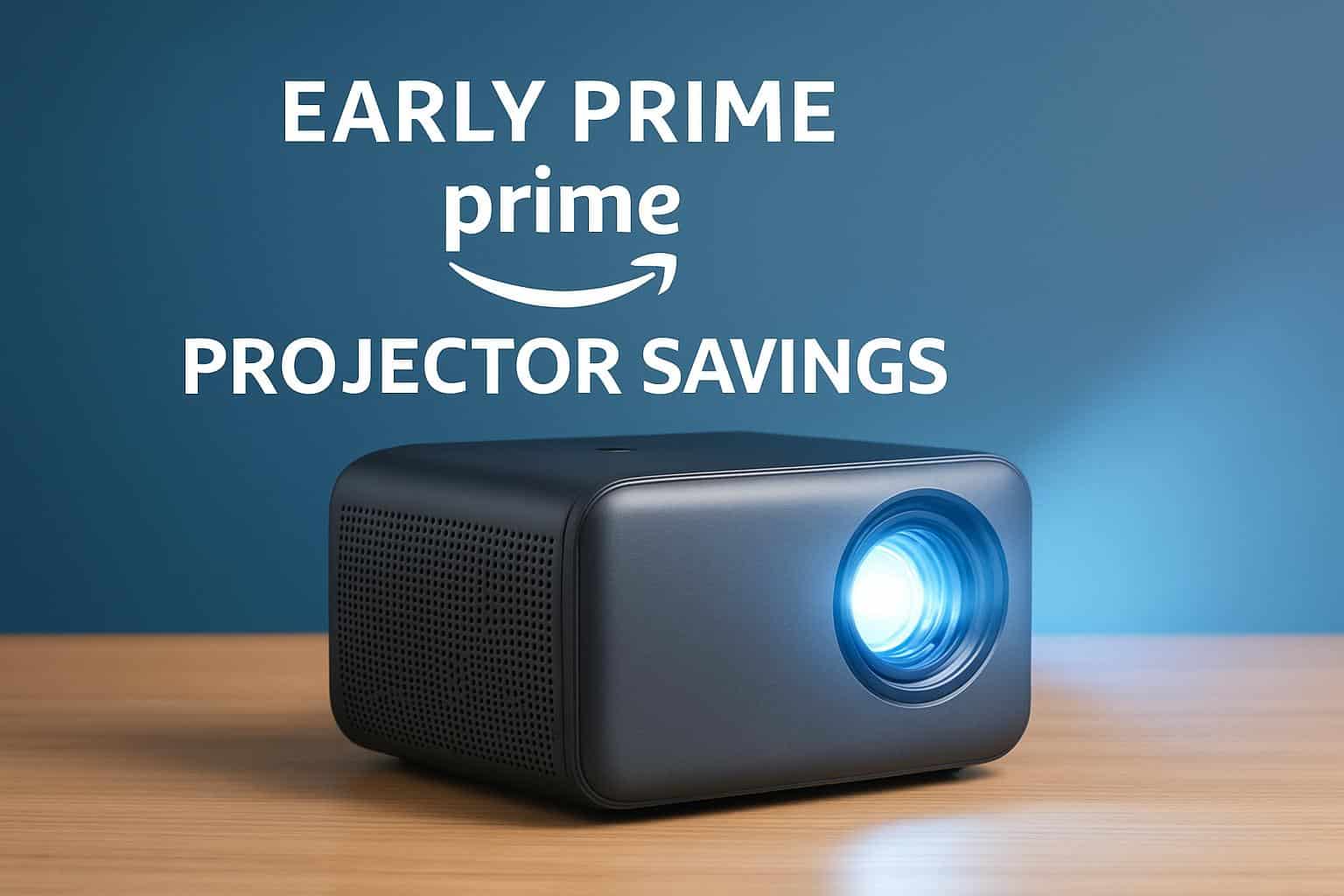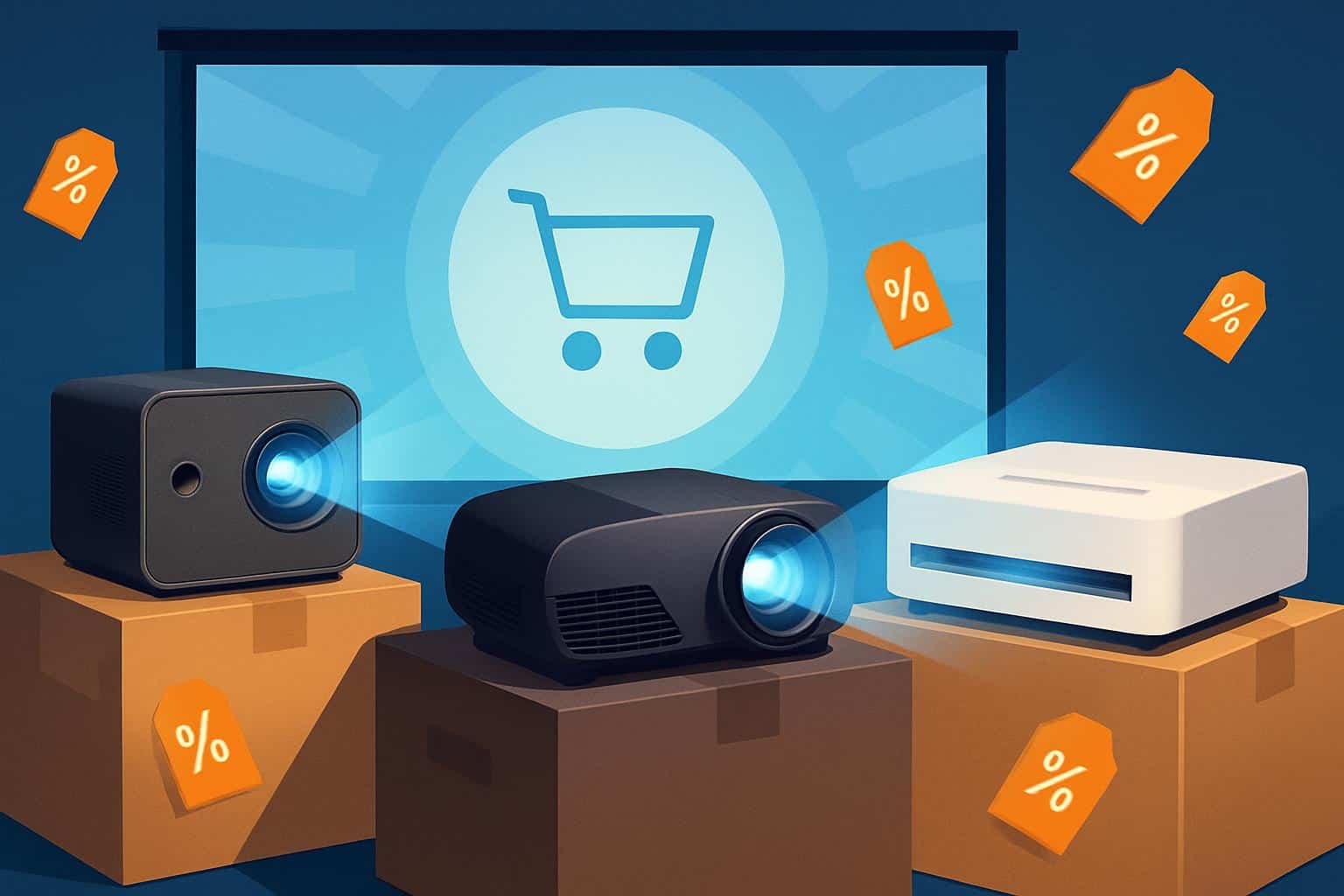Projector sales are lighting up early for Prime Big Deal Days, and it’s not all last year’s leftovers. Portable laser projectors, gaming-centric DLP models and living room-friendly ultra-short-throw projectors are already demonstrating meaningful markdowns, offering a window to build a big screen without breaking the bank.
If you’re browsing the sale roundabout, look with one eye for specs, but glance with the other at real-world use.

A cheaper price is only a win if brightness, input lag and supported streamers match how you actually watch. Studies from industry trackers like Adobe Analytics have found steady double-digit discounts on electronics during big retail events, but the deepest cuts have in recent events been on mid-range configurations — where bang for the buck is typically highest.
Why Projector Deals Pop Up Before the Rush
Retailers are eager to plant early offers so they can get a sense of demand and adjust to suit their inventory, which is why the first wave often focuses on portable LED and “carry-anywhere” laser models. According to Circana’s retail analyses, when promotions are transparent and easy to compare with elsewhere in the store, shoppers more often trade up in size; projectors lend themselves to bigger discounts — a single discount that delivers a 100-inch experience for the price of one midrange TV.
There’s another dynamic at work: cycles of components. Brands make warehouse space by having newer light engines or image processors roll in. That often means last year’s well-reviewed projectors — which have already been tested by independent testers — are prime candidates for early price cuts.
Specs That Matter (And What to Know Before You Click Buy)
Brightness + light source: For movie nights in a dark room, 500–800 ANSI lumens can get by with a matte screen. If you’re adding ambient light, you’ll probably want between 1,000 and 2,500 ANSI lumens; bright living rooms or backyards call for more. LED and laser projectors usually claim 20,000–30,000 hours of life. Traditional lamps hover between 4,000–6,000 hours, a message that’s repeated often in guidance offered by the Consumer Technology Association.
Resolution and pixel shifting: Many “4K” DLP units employ a 0.47-inch or 0.66-inch DMD that has been programmed to shift the pixels, enabling it to achieve a resolution of up to around 8.3 million on-screen pixels.
That can and does look absolutely ultra-sharp, but a finely tuned 1080p projector still makes sense to me under 100 inches or if gaming at high refresh where throughput trumps simple pixel count.
Gaming performance: Gamers looking for the most responsive projector will want to target an input lag below 20ms at 1080p/60; a few dedicated gaming projectors can achieve input lags in the mid-teens. If you have your sights set on 120Hz or VRR support, verify the specific modes and ports — HDMI 2.1 isn’t universal in this segment.
Streaming and Netflix tipoffs: Android TV and Google TV integration is widespread, but not all carry a fully licensed version of the Netflix app. This is called out on ProjectorCentral and brand support pages often; a $30 streaming stick is an easy backup when native apps are sparse.
Throw distance and your room: Short-throw (approximately 0.5:1) and ultra-short-throw (about 0.25:1) units can project a crisp, equally large, vivid image while sitting just inches from the wall — a godsend for small quarters. Make sure its throw ratio matches calculators for your model before you buy, so it actually fits on the wall between and around your shelves or sofa.
Early Standouts Worth Watching for Projector Deals
Portable laser projectors like the Anker Nebula Capsule 3 Laser and Xgimi Halo+ have dominated early promotions in recent cycles, combining auto-focus, auto-keystone and battery power with enough brightness for bedroom or patio viewing. They’re not sun-proof, but what they sacrifice in UV protection they make up in portability, and reviewers frequently compliment the sound quality for their size.
If you’re hankering for a cinematic jump, those room-to-room 4K units such as the Anker Nebula Cosmos Laser 4K, BenQ TK700 series or Optoma UHD55 and its ilk tend to have compelling markdowns before the main event.

You can also expect a beefier implementation of HDR10, 4K upscaling and punchier speakers too (though the addition of a soundbar over HDMI eARC really does lift it into another league).
For living rooms that don’t allow for much throw, be on the lookout for ultra-short-throw options like those in the Hisense PX1-PRO or Epson EpiqVision ultra-short-throw lines. These are best paired with so-called ambient-light-rejecting screens, but even a clean, flat wall can be pretty impressive once you dial in focus and geometry.
Price Benchmarks And Identifying A True Bargain
Begin from the model number, not just a brand.
Cross-reference historical pricing on known price-tracking sites and compare to the manufacturer’s site for MSRP and average street price. Discounts on electronics during big sales can also appear bigger than they are if the “list price” isn’t a realistic one — Adobe’s own research suggests that context matters as much as the percentage off.
Read beyond the headline: bundled screens, extended returns or accidental-damage coverage may offer real value. And it is a pretty laid-back attitude to store open-box merchandise with new inventory, as well — great if you don’t mind some minor activity on yours before buying, but do check the warranty terms, because this can be convoluted.
Setup Tips for Perfecting a New Projector
Lend a hand to auto-focus: even smart systems can do with some manual fine-tuning on a 100-inch test grid. If keystone adjustment leads to softer edges, attempt first physically raising or repositioning the projector — optical alignment trumps digital hacks for sharpness.
Control the light: a neutral-gray or ALR (ambient-light-rejecting) screen increases perceived contrast in rooms with ambient light. Blackout curtains or a nighttime-viewing schedule can make a 700-lumen portable projector feel as if it doubled in brightness.
Adjustable color: a lot of projectors are shipped in the vivid mode, so that they “pop” when set up on a showroom floor. Move to a cinema or reference preset and slightly nudge brightness and color temperature. When ISF-calibrated modes are present, you may find they offer the most accurate skin tones out of the box.
Plan your sound: integrated speakers have gotten better, but they still have to face physics. A small soundbar or powered bookshelf speakers connected with a single cable (HDMI eARC or optical) can bring greater dialogue clarity and bass presence.
The big picture: Early Prime Big Deal Days projector discounts are legit, but the best purchases strike a price-performance balance that fits your room, your habits and your screen-size aspirations.
However, lock in the proper spec set now, and you’ll be able to watch what remains of the sale from a very large, very comfortable seat.

